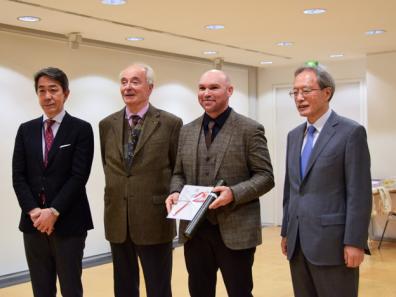Edouard L'Herisson, winner of the 2021 Shibusawa Claudel Prize

On October 8, Mr. Edouard L'Hérisson was awarded the Shibusawa Claudel prize, a Franco-Japanese cultural and scientific award, for his thesis entitled Shintō trajectories and the construction of Japanese Manchuria: religious spatialization, empire expansion and the structuring of modern Shintō, defended in 2020 under the supervision of Michael Lucken, professor specializing in Japan, historian and art historian.

About Edouard L'Hérisson
After a master's degree at the University of Aix-Marseille, Edouard L'Hérisson began a thesis at the Institut national des langues et civilisations orientales. During his doctoral research, he focused on the place of shintō in Japan's expansion into Manchuria, and was a visiting researcher at the Center for Research on Unwritten Documents (Himoji shiryō kenkyū sentā, Kanagawa University). He has also been a temporary teaching and research associate at the University of Aix-Marseille. Currently a young researcher at the French Institute for Research on East Asia (IFRAE/UMR 8043) and associate researcher at the Institute for Research on Asia (IrAsia/UMR 7306), he is continuing his study of the spread of Shintō within the imperial space and the expansion of new modern and contemporary Japanese religious movements.
Thesis summary
Modern shintō is often reduced to a unified ritual system, centered on shrines perceived either as avatars of the state shintō, or as popular places of worship. This reading is further emphasized in the case of Japanese expansion in Asia. The primary ambition of this thesis is to show that these two aspects are in fact complementary and play a part in the imperial dynamic of the first half of the 20th century. Contrary to readings that deny the authenticity of modern Shintō, it thus aims to prove that the latter constitutes a genealogically coherent religious system whose modern expression is characterized by a dynamic of imperial, indeed universal, projection, centered on new pantheistic doctrines. The study is based on three trajectories of Shintō leaders involved in the construction of Japanese Manchuria: Matsuyama Teizō 松山珵三 (1878-1947), Deguchi Onisaburō 出口王仁三郎 (1871-1948) and Kakei Katsuhiko 筧克彦 (1872-1961). These three cases highlight three modalities of encounter with Manchu space, perceived in its diatopic dimension, and as many processes of spatialization of this region. It is thus possible to understand how these Shintō preachers are both driven by, and engines of, imperial dynamics in territories stretching from the Liaodong peninsula to the border of Outer Mongolia. The fluid space that is Japanese Manchuria thus appears as the target of religious and colonial appropriations within which individual and state ambitions intertwine.
The Shibusawa-Claudel Prize
The Shibusawa-Claudel Prize was created in 1984 on the initiative of the Maison franco-japonaise (MFJ) in Tôkyô and the Mainichi Shimbun, supported by the Eichii Shibusawa Memorial Foundation, on the occasion of the 60th anniversary of the Maison franco-japonaise. It commemorates the founding of the MFJ by French ambassador, poet and playwright Paul Claudel and Japanese entrepreneur and patron Eiichi Shibusawa.
Since 2008, it has been co-organized with the daily Yomiuri and rewards high-level works that reflect research into Japanese and French cultures.
Each year, by awarding a prize in France for a book or academic work on Japan, and in Japan for a book or academic work on France, the Shibusawa-Claudel Prize aims to encourage cultural exchanges and mutual understanding between the two countries.
From 2021, the Fondation France-Japon de l'École des hautes études en sciences sociales (FFJ) will join the organization of the French component of this Prize.